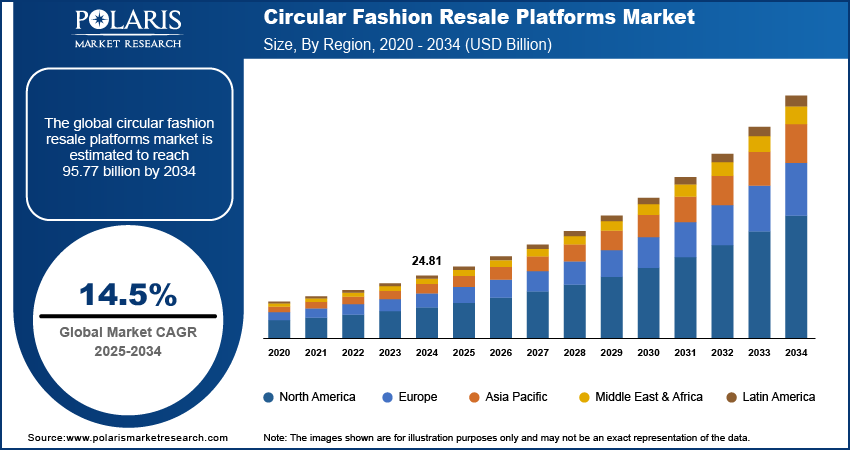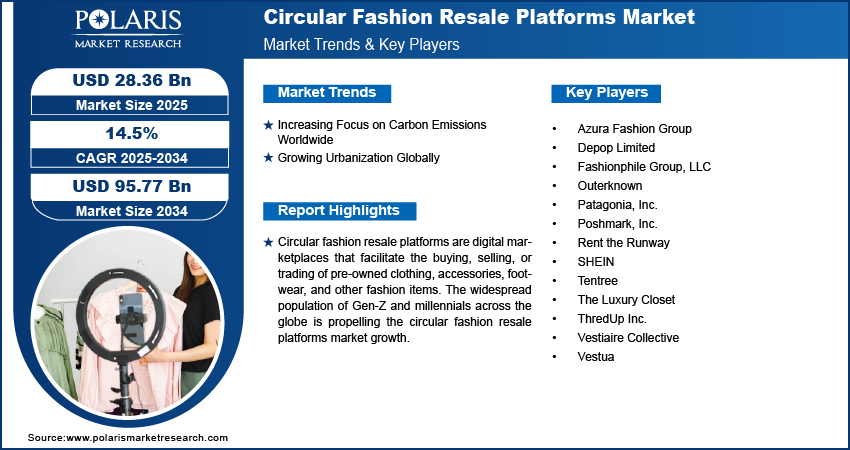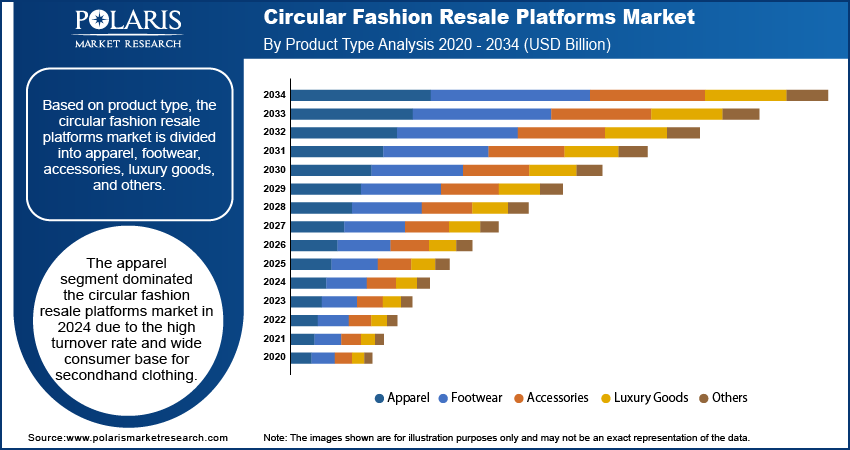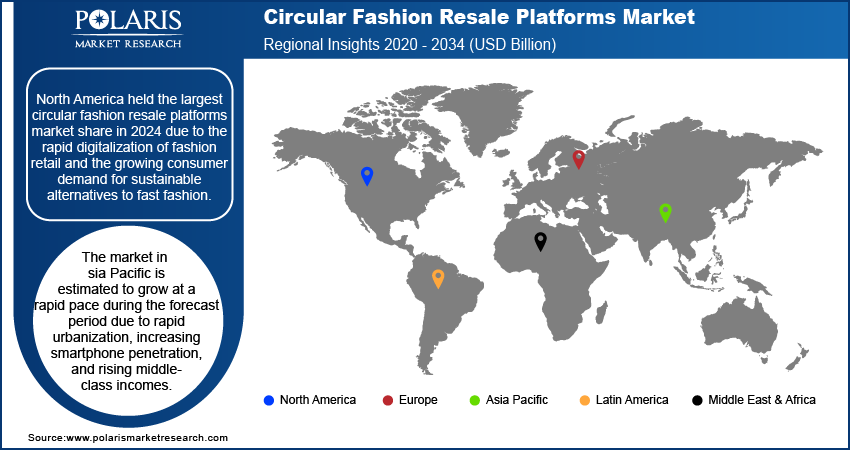
Circular Fashion Resale Platforms Market Size, Share, Trends, Industry Analysis Report
: By Product Type (Apparel, Footwear, Accessories, Luxury Goods, and Others), Platform Type, Sales Channel, and Region (North America, Europe, Asia Pacific, Latin America, and Middle East & Africa) – Market Forecast, 2025-2034
- Published Date:May-2025
- Pages: 129
- Format: PDF
- Report ID: PM5597
- Base Year: 2024
- Historical Data: 2020-2023
Circular Fashion Resale Platforms Market Overview
Circular fashion resale platforms market size was valued at USD 24.81 billion in 2024. The market is projected to grow from USD 28.36 billion in 2025 to USD 95.77 billion by 2034, exhibiting a CAGR of 14.5 % during 2025-2034.
Circular fashion resale platforms are digital marketplaces that facilitate the buying, selling, or trading of pre-owned clothing, accessories, footwear, and other fashion items. These platforms operate on the principles of a digital circular economy, which aims to minimize waste, extend product lifecycles, and reduce the environmental impact of the fashion industry. These platforms cater to a wide range of consumers, from budget-conscious shoppers to those interested in luxury goods, offering a diverse product portfolio that spans casual wear, formal attire, vintage items, and high-end designer collections. Circular fashion resale platforms also leverage technology to enhance their functionality and appeal. Features such as AI-driven pricing tools, authentication services for luxury goods, and personalized recommendations improve the user experience and build trust within the community.
The widespread presence of Gen-Z and millennials across the globe is significantly driving the growth of the circular fashion resale platforms market. These younger generations are increasingly prioritizing environmental responsibility and social consciousness in their purchasing behaviors, leading them to seek sustainable alternatives such as second-hand or pre-owned clothing. Circular fashion platforms cater to this shift by promoting the reuse of garments, helping reduce waste and conserve natural resources—values that deeply resonate with these demographics. Moreover, Gen-Z and millennials are digital natives who are highly comfortable with technology and online shopping, making these platforms more accessible and appealing. Financial pressures, including student loans, rising housing costs, and broader economic uncertainties, further incentivize them to find budget-friendly ways to stay fashionable without compromising their principles. Circular fashion resale platforms address this need by offering stylish, high-quality pieces at affordable prices. As a result, the market is experiencing steady growth, fueled by the increasing engagement of these socially conscious and tech-savvy consumers. For instance, a report by the World Economic Forum highlights that Gen-Z alone makes up 1.8 billion individuals globally, accounting for 23% of the world’s population—underscoring the vast potential of this market segment.

To Understand More About this Research: Request a Free Sample Report
The circular fashion resale platforms market demand is driven by the growing digitalization globally. Digitalization enhances the visibility and reach of circular fashion platforms through targeted marketing and social media. It propels the adoption of these platforms to users based on their preferences and shopping habits. Moreover, advancements in digital payment systems and logistics further support the rise of circular fashion resale platforms. Secure and instant payment options make transactions smoother and more reliable, encouraging people to purchase sustainable clothing options through online circular fashion resale platforms, thereby contributing to market expansion.
Circular Fashion Resale Platforms Market Dynamics
Increasing Focus on Carbon Emissions Worldwide
The fashion industry contributes significantly to global carbon emissions, prompting eco-conscious shoppers and the government to shift toward sustainable alternatives. Circular fashion resale platforms extend the lifecycle of clothing, reducing the need for new production and lowering the carbon footprint associated with apparel manufacturing, transportation, and waste. Corporate sustainability commitments also amplify the demand for circular fashion as brands and retailers adopt carbon-neutral goals. Many companies now partner with circular fashion resale platforms or launch their recommerce programs to meet emissions targets, thereby driving the circular fashion resale platforms market expansion.
Growing Urbanization Globally
Urban areas are increasingly characterized by space constraints and higher living costs, prompting many residents to embrace minimalist lifestyles and seek cost-effective, eco-conscious alternatives to fast fashion. In this context, circular fashion resale platforms have emerged as a viable solution, offering access to second-hand clothing that aligns with both budgetary and environmental concerns. At the same time, urbanization fosters technological advancement and greater digital literacy, creating a population that is well-equipped to engage with online platforms. With widespread access to smartphones and the internet, urban residents can conveniently browse, buy, and sell pre-owned clothing, further driving the appeal of these platforms. As a result, the convergence of economic pressures, environmental awareness, and digital connectivity fuels the rising demand for circular fashion resale in urban settings. This trend is expected to accelerate, supported by projections from the World Economic Forum indicating that the global urban population will reach 80% by 2050, underscoring the growing relevance of sustainable fashion solutions in densely populated environments.

Circular Fashion Resale Platforms Market Segment Insights
Circular Fashion Resale Platforms Market Evaluation by Product Type
Based on product type, the circular fashion resale platforms market is divided into apparel, footwear, accessories, luxury goods, and others. The apparel segment dominated the circular fashion resale platforms market in 2024 due to the high turnover rate and wide consumer base for secondhand clothing. Consumers across age groups consistently seek affordable, stylish, and sustainable wardrobe options, making apparel the most traded product type in the resale space. Fast fashion’s environmental impact has pushed many shoppers, especially younger ones, to shift toward pre-owned clothing. Online platforms have responded by expanding their inventory, offering everything from basics to designer pieces. The ease of listing, browsing, and purchasing used apparel through mobile apps and websites further propelled segment dominance. Additionally, the social aspect of sharing outfit inspirations and styling tips on platforms such as Instagram and TikTok increased visibility and desirability for secondhand clothing, helping the apparel segment dominate the market share.
Circular Fashion Resale Platforms Market Assessment by Platform Type
The circular fashion resale platforms market segmentation, based on platform type, includes peer-to-peer (P2P) platforms, business-to-consumer (B2C) platforms, and consumer-to-business-to-consumer (C2B2C) platforms. The peer-to-peer (P2P) platforms segment dominated the circular fashion resale platforms market share in 2024 due to their accessibility, community-driven nature, and low barriers to entry. These platforms allowed individual users to buy and sell pre-owned fashion directly, creating a personalized shopping experience that resonated with younger, tech-savvy consumers. Many users preferred P2P models as they offer better price flexibility and the chance to discover unique or vintage items that large retailers do not carry. The growing appeal of direct connections with sellers, coupled with the added sense of trust fostered by reviews and ratings, contributed to the continued rise in popularity of P2P platforms throughout the year.
The consumer-to-business-to-consumer (C2B2C) segment is expected to grow at a robust pace in the coming years. These platforms actively differentiate themselves by offering curated selections, professional authentication, and enhanced quality assurance. Consumers are actively attracted to C2B2C models as they provide peace of mind when purchasing high-value items such as luxury goods or designer apparel. The rise of counterfeit products in the resale space actively drives demand for platforms that guarantee authenticity, a service C2B2C operators actively excel at providing. Furthermore, these platforms actively attract environmentally-conscious shoppers by emphasizing sustainability and extending the lifecycle of premium products.

Circular Fashion Resale Platforms Market Regional Analysis
By region, the study provides circular fashion resale platforms market insights into North America, Europe, Asia Pacific, Latin America, and the Middle East & Africa. North America held the largest circular fashion resale platforms market share in 2024 due to the rapid digitalization of fashion retail and the growing consumer demand for sustainable alternatives to fast fashion. The US dominated the regional market, supported by the presence of major players such as thredUP, Poshmark, and The RealReal. These platforms leveraged advanced AI-powered recommendation engines and seamless mobile interfaces to enhance user experience and drive engagement. Additionally, strong consumer awareness around environmental issues and a cultural shift toward minimalist, secondhand fashion trends fueled substantial market growth in the region. The resale model gained significant traction among Millennials and Gen Z in the region, who prioritized both style and sustainability in their purchasing decisions.
The circular fashion resale platforms market in Asia Pacific is estimated to grow at a rapid pace during the forecast period due to rapid urbanization, increasing smartphone penetration, and rising middle-class incomes. Furthermore, a growing youth demographic in countries such as India, Indonesia, and Vietnam is embracing secondhand fashion as a cost-effective and eco-conscious choice, thereby fueling market expansion. According to a report by the Ministry of Health and Family Affairs, Government of India, the youth (aged 15–29 years) comprised 27.2% of the country’s overall population in 2021. Regional governments and sustainability-focused policies are also encouraging circular consumption models, further strengthening the market growth. The demand for tech-enabled resale services is expected to surge as more consumers across the region seek affordable and environmentally responsible options, positioning Asia Pacific as a key region in circular fashion.

Circular Fashion Resale Platforms Key Market Players & Competitive Analysis Report
The competitive landscape of the circular fashion resale platforms market is characterized by intense rivalry, driven by key players focusing on strategic mergers, acquisitions, partnerships, and collaborations to strengthen their market position and expand their product portfolios. Mergers and acquisitions have become a foundation for growth, enabling companies to consolidate their resources, eliminate competition, and access new customer bases. Partnerships and collaborations further play a pivotal role in shaping the competitive dynamics as companies seek to leverage each other's expertise and infrastructure. Furthermore, companies are investing heavily in marketing and branding efforts to enhance visibility and customer engagement.
The circular fashion resale platforms market is fragmented, with the presence of numerous global and regional market players. Major players in the market are Azura Fashion Group; Depop Limited; Fashionphile Group, LLC; Outerknown; Patagonia, Inc.; Poshmark, Inc.; Rent the Runway; SHEIN; Tentree; The Luxury Closet; ThredUp Inc.; Vestiaire Collective; and Vestua.
Depop Limited is a prominent circular fashion resale platform that has revolutionized the online shopping experience, particularly for Gen Z consumers. Founded in 2011 by Simon Beckerman in Roncade, Italy. The company moved its headquarters to London in 2012, marking the beginning of its global expansion. Depop currently operates its offices in Manchester, Milan, and New York City and serves millions of users worldwide. The Depop platform is designed with an Instagram-like interface that emphasizes high-quality visuals of items worn by sellers. Depop's growth trajectory has been fueled by significant investments and strategic initiatives.
Azura Fashion Group is a Sydney-based technology-driven company specializing in circular fashion and sustainability. Founded in 2018, Azura has emerged as a prominent player in the global fashion industry by leveraging artificial intelligence (AI) and deep learning to revolutionize C2C (Consumer-To-Consumer) e-commerce operations. The company's mission is to promote the circular economy by reducing fashion waste and making luxury fashion accessible to a broader audience. Azura facilitates the resale of pre-loved and end-of-season luxury items through its platforms, such as Azura Runway and Azura Reborn, aligning with the growing consumer demand for sustainable fashion practices. The company serves over 100 million customers across key markets such as the US, UK, and Asia. Its extensive logistics network ensures timely delivery of products while maintaining high standards of quality control.
Key Companies in Circular Fashion Resale Platforms Market
- Azura Fashion Group
- Depop Limited
- Fashionphile Group, LLC
- Outerknown
- Patagonia, Inc.
- Poshmark, Inc.
- Rent the Runway
- SHEIN
- Tentree
- The Luxury Closet
- ThredUp Inc.
- Vestiaire Collective
- Vestua
Circular Fashion Resale Platforms Market Developments
June 2024: Azura Fashion Group, an Australian-based fashion technology company, announced the launch of an AI-powered platform to drive circular fashion.
June 2024: SHEIN launched SHEIN Exchange, an integrated online peer-to-peer resale platform to buy and sell previously owned SHEIN products in Europe and the UK.
October 2022: eBay, in collaboration with the British Fashion Council, announced to launch Circular Fashion Innovator’s Fund, offering £100,000 or USD 130 thousand in funding for businesses involved in circular fashion solutions.
Circular Fashion Resale Platforms Market Segmentation
By Product Type Outlook (Revenue, USD Billion, 2020-2034)
- Apparel
- Footwear
- Accessories
- Luxury Goods
- Others
By Platform Type Outlook (Revenue, USD Billion, 2020-2034)
- Peer-to-Peer (P2P) Platforms
- Business-to-Consumer (B2C) Platforms
- Consumer-to-Business-to-Consumer (C2B2C) Platforms
By Sales Channel Outlook (Revenue, USD Billion, 2020-2034)
- Online Platforms
- Mobile Applications
- Social Media Marketplaces
By Regional Outlook (Revenue, USD Billion, 2020-2034)
- North America
- US
- Canada
- Europe
- Germany
- France
- UK
- Italy
- Spain
- Netherlands
- Russia
- Rest of Europe
- Asia Pacific
- China
- Japan
- India
- Malaysia
- South Korea
- Indonesia
- Australia
- Vietnam
- Rest of Asia Pacific
- Middle East & Africa
- Saudi Arabia
- UAE
- Israel
- South Africa
- Rest of Middle East & Africa
- Latin America
- Mexico
- Brazil
- Argentina
- Rest of Latin America
Circular Fashion Resale Platforms Market Report Scope
|
Report Attributes |
Details |
|
Market Size Value in 2024 |
USD 24.81 Billion |
|
Market Size Value in 2025 |
USD 28.36 Billion |
|
Revenue Forecast by 2034 |
USD 95.77 Billion |
|
CAGR |
14.5% from 2025 to 2034 |
|
Base Year |
2024 |
|
Historical Data |
2020– 2023 |
|
Forecast Period |
2025 – 2034 |
|
Quantitative Units |
Revenue in USD Billion and CAGR from 2025 to 2034 |
|
Report Coverage |
Revenue Forecast, Market Competitive Landscape, Growth Factors, and Industry Trends |
|
Segments Covered |
|
|
Regional Scope |
|
|
Competitive Landscape |
|
|
Report Format |
|
|
Customization |
Report customization as per your requirements with respect to countries, regions, and segmentation. |
FAQ's
The global circular fashion resale platforms market size was valued at USD 24.81 billion in 2024 and is projected to grow to USD 95.77 billion by 2034.
The global market is projected to register a CAGR of 14.5% during the forecast period.
North America had the largest share of the global market in 2024.
Some of the key players in the market are Azura Fashion Group, Depop Limited, Fashionphile Group, LLC, Outerknown, Patagonia, Inc., Poshmark, Inc., Rent the Runway, SHEIN, Tentree, The Luxury Closet, ThredUp Inc., Vestiaire Collective, and Vestua.
The apparel segment dominated the circular fashion resale platforms market revenue share in 2024.
The consumer-to-business-to-consumer (C2B2C) platforms segment is expected to grow at the fastest pace in the coming years.
